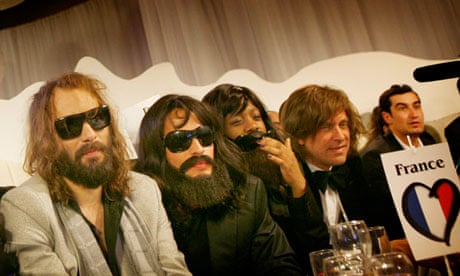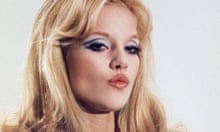Sébastien Tellier is perhaps the archetypal French pop star: louche yet naive, sensitive yet flippant, proud of his French heritage but determined to sing mostly in English to reach a wider audience. He first rose to prominence in 2004 with his mellifluous, lovelorn anthem La Ritournelle, while subsequent albums Politics, and Sexuality (produced by Daft Punk's Guy-Manuel de Homem-Christo) grappled with the big issues facing mankind in his own charmingly candid way. His current effort, My God is Blue, explores his spiritual side. In 2008 he was chosen to represent France in the Eurovision song contest, finishing 19th with his song Divine. He lives in Paris.
Bonjour Sébastien. Did you always want to be a pop singer?
Yes, because I was very bad at school, and all the jobs I could imagine were awful, like working in the office or driving a bus. Luckily, my parents never told me I had to become a doctor or a teacher. They were very happy for me to be a musician. So for me it was a very tranquil path, and it was easy to choose music.
Was it difficult to imagine how you could make it in the pop world, given the lack of French role models in the 80s?
Yes, it felt very out of reach. In France we have a very weird vision of music. For example, a French person doesn't listen to the bass or the fire of the drums – they just listen to the lyrics. When I was a teenager, my dream was to be an American guy and sing for a band like Guns N' Roses. But for a French person, it's really hard to be in contact with American or English bands, because you guys are already so good at that type of music.
So how did you go about developing a style that you thought would appeal outside France?
My solution was to try to understand why English and American pop music was so good and French pop music was so bad, and try to be different from my countrymen. Of course, we've had great singers like Serge Gainsbourg and Christophe and Michel Polnareff … I tried to just keep the sexy side of French music and to forget all the rest.
Have French and British music tastes become less polarised?
Yes, because now it's easier to travel to different countries and, of course, everyone can use the internet to exchange cultural ideas. It's easier now for a French guy to be an international musician.
Reading this on mobile? Click here to view
Do you think you have played a part in that coming together? Do you feel your success could be an inspiration to budding French pop musicians?
I hope so. That would be a big pleasure for me. I am the slave of other artists like Salvador Dalí or Stevie Wonder, so it would be a dream for me if one day I could be like that for other musicians. For me it's important to give something back. When I play music, it's not for music or glory, but to burn the mind of others – to have an influence on the music of the future.
Your music, particularly on the Sexuality album, is renowned for being quite raunchy. Is that a characteristic you might say is quintessentially French?
It's true that in our country we are very free with sex. It is common to see naked women on the TV, and it was easy to shoot my video for Cochon Ville with a lot of naked people. I'm sure it would be very hard to do that in California, for example. In France it can be classy to talk about sex, and I think that is not the same with all the countries in the world. But the sexual side of the French character exists in the spirit and the soul – it is still not so common to find music that talks about sex. My message is that vice can be good as well as bad – you can take pleasure from vice. Cochon Ville is a message of freedom and I try to say to everyone: "Don't forget the vice! It's not just bad, there is a good side of vice."
Whether you're talking about sexuality or spirituality, your lyrics tend to be frank and open, almost naively so. Is that another quintessentially French quality?
I don't know. It's just that, for me, to make good music, you have to discover something when you compose. That's why I like to choose topics that are bigger than me. On this album [My God is Blue] I tried to discover the spiritual side of life and before I tried to discover the sexual side of life, and before that the political side. I try to be a beginner for ever because that way you always sound fresh.
Do you still live in the business district of Paris?
Reading this on mobile? Click here to view
Yes. I don't know why, but I don't like the bohemian side of big cities. Of course it's cute and you have a lot of little shops, but you recognise every day the same people. It's like a village. For me, I'm very happy in an impersonal neighbourhood where nobody says hello. I feel alone, and that's a very comfortable feeling.
Does that sense of isolation within the city help you to focus on writing music?
Of course. I believe that when you're thinking, electricity goes out of your brain. When there are a lot of other people thinking around you, all this energy creates a big ball with no point. So I like to use my brain when the electricity around me is quiet. At night, after seven or eight, my neighbourhood is completely empty, so it's perfect.
For that reason, could you see yourself moving out of Paris to the countryside?
One day I will leave Paris. Maybe I'll live in Normandy. I think it's the best place in the world to create music because it's a land out of time. Everything is sweet and beautiful: the cheese is wonderful, the beef is completely gorgeous. So I think that's the life for me, but I'm too young for the countryside yet. Maybe when I'm 40 I'll leave the city.
How did your Eurovision performance go down in France? Was there ever a danger that people might think you were just taking the pee pee?
Eurovision was a fantastic experience. First, it was a wonderful party, but also it was a big opportunity for me to sing my song in front of millions of people. And it really gave me a new audience. Before, I played in front of intellectual people between 30 and 40. After Eurovision, I had young girls coming to my shows just to dance and sing and have fun. Luckily, my old audience understood why I did Eurovision, so for me it's not something shameful. It was a totally positive experience.
Which other French bands and producers do you rate?
I'm sure you know Justice. I love SebastiAn, the DJ from Ed Banger. I love Kavinsky, and Daft Punk of course – I'm very excited about their new album. Now the French scene is a very good scene – it's always trying to create something new.
Most of the artists you mention are electro producers, whereas you're a more old-fashioned kind of performer …
Yes. The father of my grandfather was a clown working in the circus, so I try to keep the good tradition of showbusiness alive. Performance is an eternal value. But I don't forget to be modern. I'm always trying to discover the future.




Comments (…)
Sign in or create your Guardian account to join the discussion